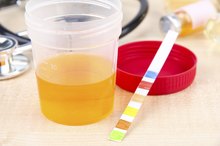Fasting Blood Tests & Black Coffee
Caffeine addicts must pay special attention to their doctors' orders for blood tests needed for routine health checks and diagnostics. Depending on the type of blood work, typical laboratory protocols can upset your coffee-shop routine with temporary dietary restrictions. Your doctor may request a blood specimen that requires previous fasting for accurate analysis. In most cases, you will have to suspend your indulgence in food, coffee, tea, energy drinks and other beverages for several hours in order to produce a viable blood sample.
Fasting Tests
Common fasting tests evaluate blood levels of glucose, triglycerides, HDL cholesterol and LDL cholesterol, and C-reactive protein to gauge diabetes and cardiovascular risks and conditions. If your health care provider adds non-fasting tests such as red blood cell counts or kidney function tests to a fasting blood profile, you will still have to fast. This means going without food or drink other than water for a certain period of time.
Black Coffee Effects
Is It Okay to Drink Coffee Before a Metabolic Panel Blood Test?
Learn More
You may think that a water-brewed drink such as black coffee won’t upset your fast, but the caffeine and other organic compounds in coffee beans that infuse the water will. These substances can change your blood chemistry or alter body functions to do so and therefore threaten the objectivity of your blood sample analysis. The Food and Drug Administration reports that caffeine remains in your system for up to six hours, causing your stomach to secrete larger amounts of acid and your kidneys to excrete more water. This causes a pH and body fluid imbalance that may affect the outcome of your blood test. Even decaffeinated coffee contains some caffeine and other compounds that can taint your blood sample.
- You may think that a water-brewed drink such as black coffee won’t upset your fast, but the caffeine and other organic compounds in coffee beans that infuse the water will.
- These substances can change your blood chemistry or alter body functions to do so and therefore threaten the objectivity of your blood sample analysis.
Fasting Instructions
A water-only fast involves not eating or drinking anything but water, generally for eight to 12 hours prior to your blood draw. Your doctor will let you know if and when you should be fasting or will refer you to the testing laboratory for explicit instructions. Unless you are given an exception, you should not eat any food during this time or drink hot or iced black coffee or tea, soda, juice, or any liquid but plain water.
Tips for Success
Will One Day Water Diet Improve Blood Test Results?
Learn More
Note your scheduled day or time for you blood test and choose a start time for your fast, based on your doctor’s instructions. Eat a nutritious dinner as usual before the cutoff time to ensure adequate blood glucose for energy while you fast. If caffeine dependency threatens your willpower, prepare a Thermos of coffee the night before your test or plan to visit a nearby cafe after your appointment.
Related Articles
References
- MedlinePlus: Glucose Test
- Coffee, brewed, prepared with tap water. FoodData Central. U.S. Department of Agriculture. Published April 1, 2019.
- Caffiene in coffee. FoodData Central. U.S. Department of Agriculture. Published April 1, 2019.
- McCusker RR, Fuehrlein B, Goldberger BA, Gold MS, Cone EJ. Caffeine content of decaffeinated coffee. J Anal Toxicol. 2006;30(8):611-3. doi:10.1093/jat/30.8.611
- Coffee, instant, reconstituted. FoodData Central. U.S. Department of Agriculture. Published April 1, 2019.
- U.S. Department of Agriculture. Coffee, espresso. FoodData Central. Published April 1, 2019.
- Tea, hot, leaf, black. FoodData Central. U.S. Department of Agriculture. Published April 1, 2019.
- Soft drink, cola. FoodData Central. U.S. Department of Agriculture. Published April 1, 2019.
- US Food & Drug Administration. Spilling the beans: How much caffeine is too much?. Updated December 12, 2018.
- Rogers PJ, Heatherley SV, Mullings EL, Smith JE. Faster but not smarter: Effects of caffeine and caffeine withdrawal on alertness and performance. Psychopharmacology (Berl). 2013;226(2):229-40. doi:10.1007/s00213-012-2889-4
- Freedman ND, Park Y, Abnet CC, Hollenbeck AR, Sinha R. Association of coffee drinking with total and cause-specific mortality. N Engl J Med. 2012;366(20):1891-904. doi:10.1056/NEJMoa1112010
- Voskoboinik A, Kalman JM, Kistler PM. Caffeine and arrhythmias: Time to grind the data. JACC Clin Electrophysiol. 2018;4(4):425-432. doi:10.1016/j.jacep.2018.01.012
- Papakonstantinou E, Kechribari I, Sotirakoglou Κ, et al. Acute effects of coffee consumption on self-reported gastrointestinal symptoms, blood pressure and stress indices in healthy individuals. Nutr J. 2016;15:26. doi:10.1186/s12937-016-0146-0
- The American College of Obstetricians and Gynecologists. Moderate Caffeine Consumption During Pregnancy. Committee Opinion: 462. Published August 2010.
- Drake C, Roehrs T, Shambroom J, Roth T. Caffeine effects on sleep taken 0, 3, or 6 hours before going to bed. J Clin Sleep Med. 2013;9(11):1195-200. doi:10.5664/jcsm.3170
- Alstadhaug KB, Andreou AP. Caffeine and primary (migraine) headaches-friend or foe?. Front Neurol. 2019;10:1275. doi:10.3389/fneur.2019.01275
- Lara DR. Caffeine, mental health, and psychiatric disorders. J Alzheimers Dis. 2010;20 Suppl 1:S239-48. doi:10.3233/jad-2010-1378
- National Institute of Diabetes and Digestive and Kidney Diseases. Eating, diet and nutrition for GER and GERD. Updated November 2014.
- Jiwani AZ, Rhee DJ, Brauner SC, et al. Effects of caffeinated coffee consumption on intraocular pressure, ocular perfusion pressure, and ocular pulse amplitude: A randomized controlled trial. Eye (Lond). 2012;26(8):1122-30. doi:10.1038/eye.2012.113
- Mitchell DC, Knight CA, Hockenberry J, Teplansky R, Hartman TJ. Beverage caffeine intakes in the U.S. Food Chem Toxicol. 2014;63:136-42. doi:10.1016/j.fct.2013.10.042
Writer Bio
Nancy Clarke began writing in 1988 after achieving her Bachelor of Arts in English and has edited books on medicine, diet, senior care and other health topics. Her related affiliations include work for the American Medical Association and Oregon Health Plan.









